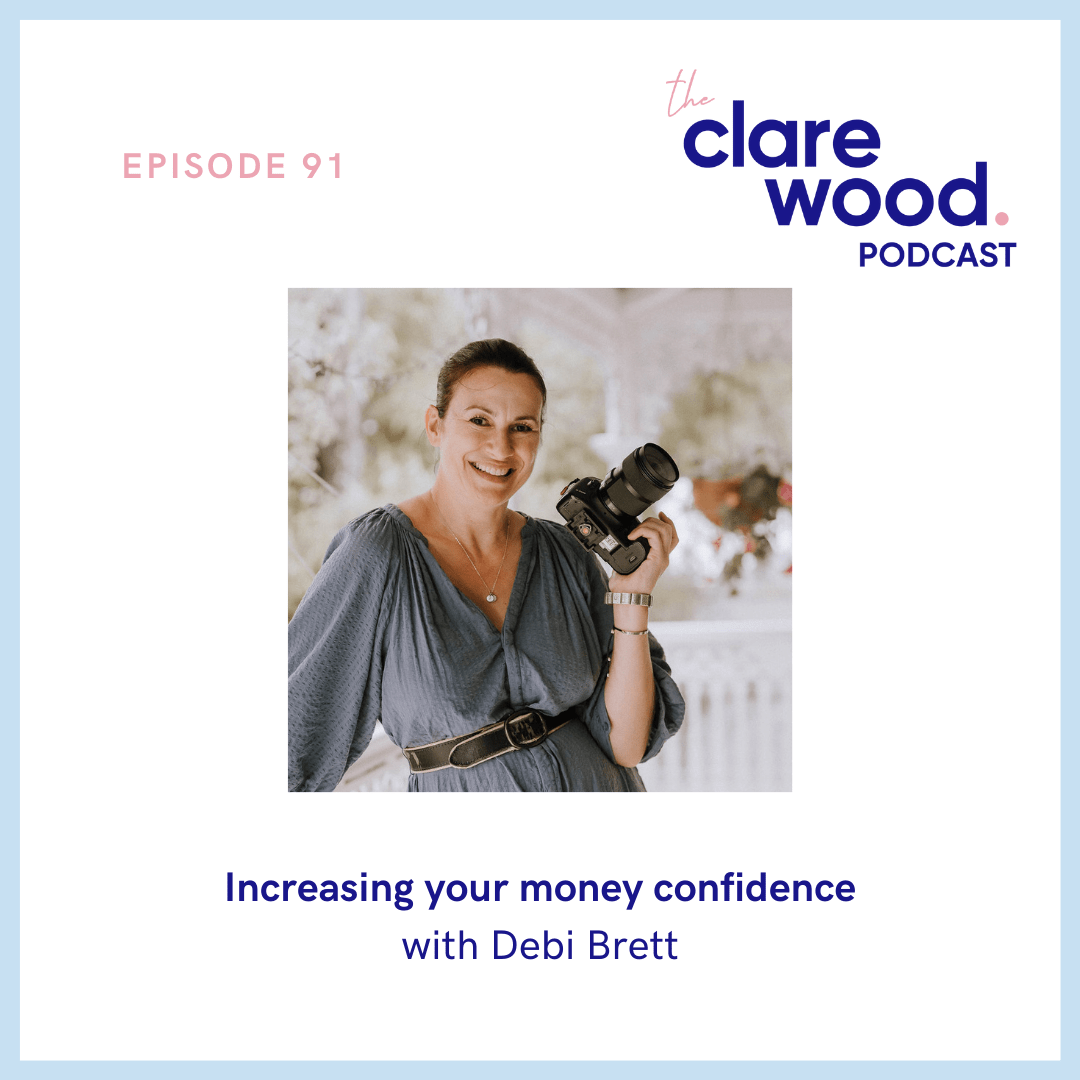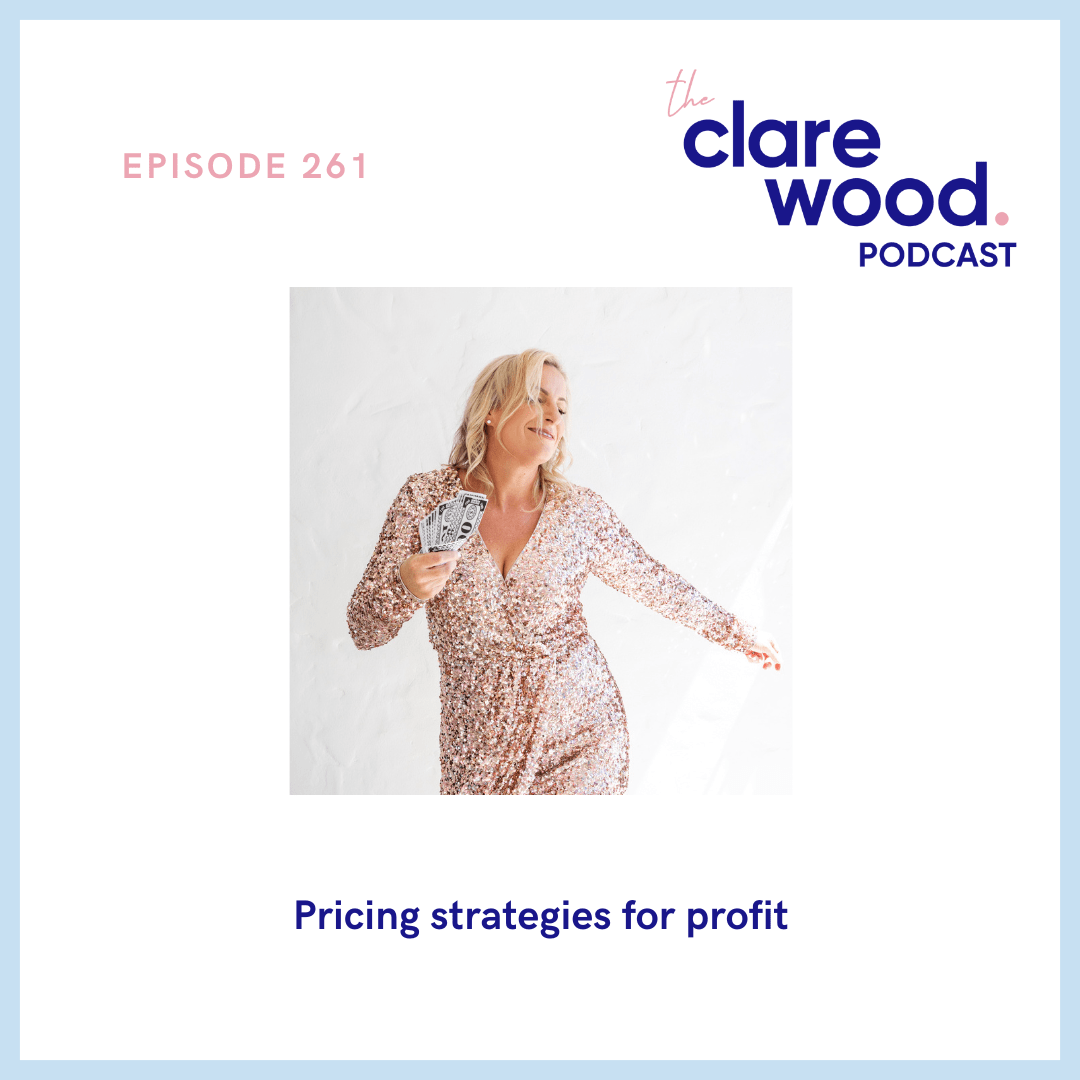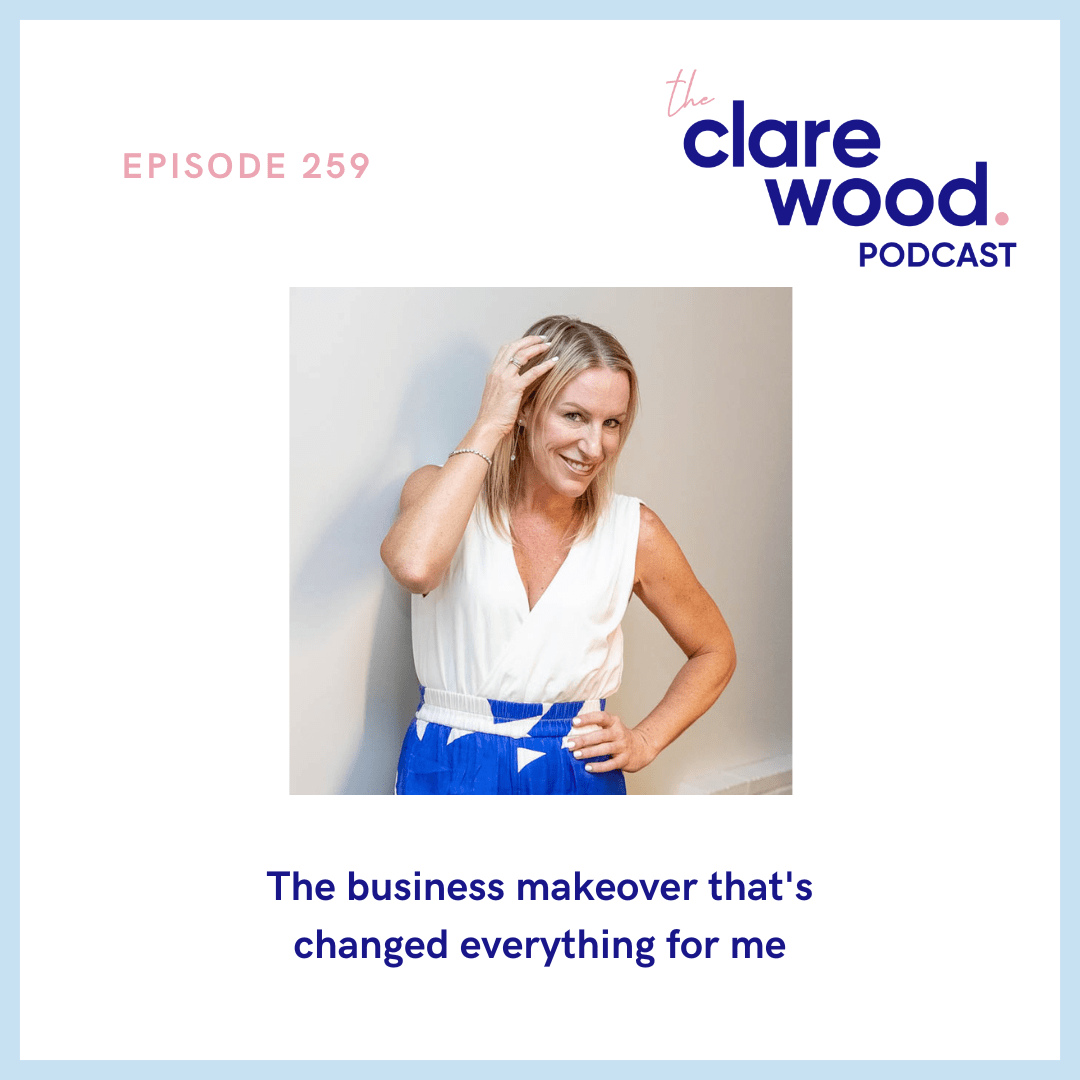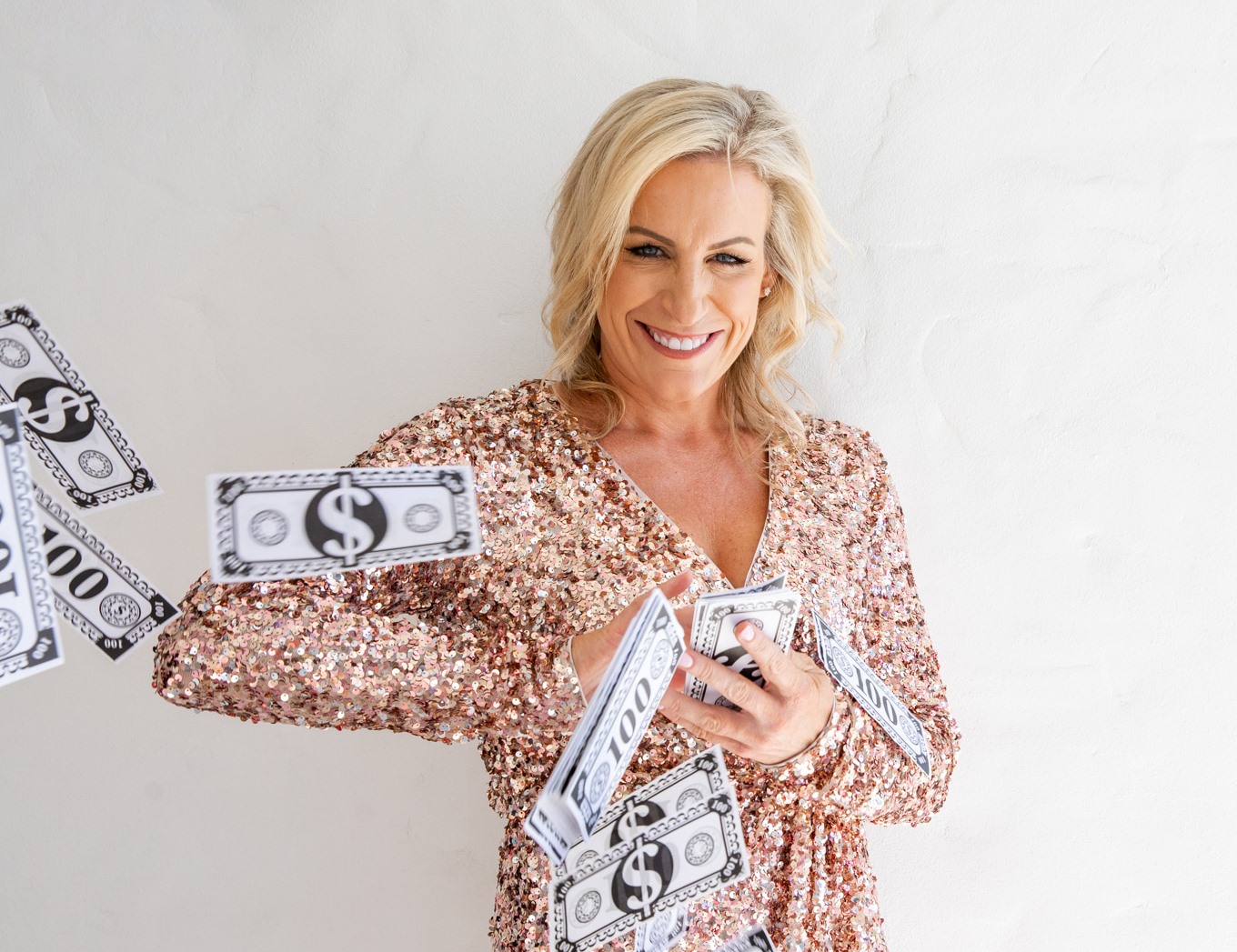Talking about money and telling someone your prices can be challenging.
In today’s episode, I chat with Debi Brett about how to increase confidence when it comes to talking about money.
In this Episode:
04.39: Why women have a tough time talking about money
08.11: Why Debi invested in money mindset work
20.48: How Debi increased her confidence around money
Links:
DEBI BRETT WEBSITE >
DEBI BRETT INSTAGRAM>
CLARE WOOD SERVICES >
CLARE WOOD INSTAGRAM >
Debi’s Bio
Using her skills as a passionate creative, photographer, videographer, educator and small business owner Debi Brett is a storytelling photographer who helps others to grow the business of their dreams, by using the surrounding environment to enhance the viewers experience. Visually and emotionally connecting customers and clients to the values of your brand voice, Debi creates beautiful styled imagery that gives your business a professional edge and allows it to stand out from the crowd. 2020 saw a successful pivot towards specialising in working with eco conscious businesses, both product and service based.
Debi is based out of her colonial style in home studio in Birkdale where she runs monthly ‘Style and Shoot’ Workshops.
Transcript
Talking about money and telling someone your prices can be a really challenging thing to do. Today I chat to Debi Brett from Debi Brett photography around how to increase your confidence when it comes to talking about money. This episode is full of practical tips, and I hope you enjoy.
Doors to my course, Million Dollar Money Management are now open. This course is for you if you want to create the mindset of a million dollar business owner, even if you aren’t even close yet. Inside this program, you’ll learn how to manage your money well, and how to magnetize more. If you’d like to join this live round of the program, you can do so by clicking in the link for the show notes for today’s episode, I’d love to welcome you in and help you manage your money like a million dollar business owner.
Hello, and welcome to the Clare Wood Podcast, where myself and incredible guests share about money, mindset, financial successes, and how to manage your money in a fun and practical way to create wealth and abundance in both your business and your life. I’m your host, Clare Wood. I’m a business coach and a money mentor. I strongly believe that money has the power to positively change the world. I can’t wait to help you transform your mindset around money, create a love of numbers and build the business of your dreams so you can live a life of financial freedom, giving and global impact.
CLARE:
A big warm welcome to the podcast. Debi, it’s so wonderful to have you here. How are you today?
DEBI:
I’m really good. Thank you. Thanks for having me.
CLARE:
Thanks for coming on. So, Debi, before we dive into today’s episode, if you’d like to introduce yourself to the listeners, share a little bit about what you do and who it is that you help.
DEBI:
Yes. My company is Debi Brett Photography, and I am a storytelling photographer for eco-conscious businesses. So I basically take photos for service and product based businesses that have eco-conscious angle and my natural style is storytelling. So it’s very emotion-based, it’s about creating imagery that connects emotionally to your clients or customers.
CLARE:
Amazing. And how did you come to niche into that particular area?
DEBI:
Well, actually it’s quite funny. By default, I was kind of getting more and more clients that were eco-conscious and then we went away camping for a weekend and I snuck a box of product into the boot and my husband saw it and he’s like, “What are you doing?” I’m like “Well, we’re going to camping. It’s in the bush. This is the perfect backdrop for all these products I’m shooting at the moment.” And he’s like, “Oh my goodness, no.” So we went and I was doing all this. And then whilst I was camping, the penny just dropped a thought, this is what I do. This is actually what I do, but I just don’t do any promotional marketing or keywords towards that business. I came home, I chatted to my business bestie and she’s like, “Oh my God, Deb, you just need to change all your keywords and change all your description. And actually you’re just describing what you already do.” And it’s been really interesting since I’ve done that, I’ve actually had a lot of people have come to me because I market myself as an eco-conscious photographer or photographer for eco-conscious products, because there’s just that, there’s a quite particular vibe that goes with that. So that’s how I kind of … it happened for me.
CLARE:
So, so good. If you are listening and you don’t have a niche, I can’t tell you how powerful owning a space is in terms of positioning your product or service offering differently. So I love, love, love that you’ve niched in on that. And once you become known for something as well, it’s a really, really great way, because all of the brands will then want to be working with you in that particular industry. Great, great. Thanks for sharing that story.
So today we’re going to be chatting a bit about money, which is my niche. My favorite thing to talk about. Debi has actually come through my course, Million Dollar Money Management and learning the money mindset skills and money management skills around creating a seven figure business. And today I wanted to chat with you about a few of the lessons that you’ve learned in the space of money mindset, and particularly around confidently talking about money. So perhaps if we start with some of your thoughts, do you think that business owners, women in particular, have a tough time talking about money? And if so, why?
Why women have a tough time talking about money
DEBI:
Oh, I think they do. And I think there’s sort of multiple reasons. I know for me personally, it was, I had my own successful business in the UK before I came to Australia and then moving to Australia coincided with us having children. So I actually took five years off of my career to be a stay at home mum, which was through choice, and I love doing that. And then when I came back into the marketplace, I came back in with a slightly different industry and the social media world, place had moved on so fast and so rapidly I lost all my confidence. It really surprised me how much my confidence was knocked. And I think as a result, my pricing was low because I just didn’t have that confidence in myself because I didn’t feel like I was on top of the game kind of thing.
And then I think the other issue for me personally, was that we also, when I went back to work, we were a two income family. We needed to have my income coming in. So I was kind of just grateful for any work that came my way as opposed to charging my worth. It was just like, “Yes, I’ll do it.” And it wasn’t always aligned with me. And it wasn’t always … I definitely wasn’t charging my worth, but that’s again, I think it’s kind of like a rite passage as well. I was building up a portfolio. I was new to the country as well as new to the area. So I didn’t have any connections. I had to build up my name. I had to build up my contacts. I had to build up every new thing. And I think that in itself was enough to knock my confidence, not to price myself, then as I started getting out there and people started recognizing me and my name, and I got some really nice clients that weren’t doing me a favor, and that was a recommendation that came to me because they wanted me. That really helped my confidence.
CLARE:
Yeah. Amazing. And so when did you sort of first hear about money mindset or money confidence and decide to sort of start doing some work on yourself in this space?
DEBI:
Gosh, I don’t think there was actually a defining moment. The whole sort of self-awareness and self development, I’ve always been really interested in that. And I don’t know, maybe it was just social media, people like Money Bootcamp and things like that that kind of got me, had an awareness that made me think I should, I have got some blocks here that I need to uncover. And I think it’s one of those things once you start going down that road, all these other things that would kind of start popping onto the spectrum or onto the horizon that you hadn’t really seen before or you had ignored and they all kind of just linked together so then my awareness just became really zoned in on, “Oh God, yeah. Some money blocks here.”
CLARE:
Yes. It’s so interesting, isn’t it. Once you sort of start to identify that you do have stories around money, you find that there’s so many. I still, and I like to say this to people as well. I still have money blocks and money stories, even though I’ve done so much work in this space. And in fact, when you move through different levels in your business, more and more come up. So it’s really interesting that you started to hear about it through social media, and you obviously reached a point where you decided to come and invest in the course with me, which I’m very, very grateful that you chose to do. So why did you decide to go down that route and actually pay to, invest some time and money in this space?
Why Debi invested in money mindset work
DEBI:
Well, I’d been following you for a while. So I kind of know you’ve got that trust element going and the things you were saying through your social media, were really resonating with me. And I think as I realized that my money blocks were quite heavily or closely linked to my self-worth, I realized that it wasn’t just about, I’ve got to have the confidence charge more money, there was actually something deeper there that I needed to unpack. And I wasn’t quite sure how to do that.
So I think I actually do remember, I was sitting, I kind of really got into the whole law of attraction and things like that as well. And I was sitting on my computer debating whether to sign up and then something came through, pinged through my social media that was completely aligned with, you must do this course. I was like, “Right. I’m just doing it.” I literally signed up on the spot and it was brilliant. I’m so glad I did. It was such a good course, but it was, it was unpacking that it wasn’t just about confidence. There was more, it was more deeply aligned to historical money blocks and childhood and self-worth.
CLARE:
I’m so glad that you did. And it’s so weird that happens, sort of thing happens to me all the time. You’re going to buy something new and then suddenly you’re like, “Oh my gosh, there’s that word again? Or there’s another sign or there’s another sign.” I sometimes think that the universe gives us little nudges when we’re not quite sure.
DEBI:
Oh, it definitely was a nudge. It was so well timed. It was too well-timed not to be a nudge from the universe to do the course.
CLARE:
I love that. So let’s talk a bit more about confidence. So, we obviously spent a lot of time in the course, we were doing sort of journaling exercises and really diving into some of those stories and things like that. What were some of the first signs that your confidence around money was starting to increase?
DEBI:
I think when I redid my websites and it was an option for me to, I shuffled my packages around, so it was an opportunity to change my pricing. And I think I just kind of, I just took a big gulp and went for it and just put my package … I doubled my prices and I almost got to the point where it was, “Well, I actually can’t build a viable business on the money that I was charging.” And it’s not just about being a photographer. I love small business. I want it to be a successful, financially successful business. And we need it to be a financially successful business within the family for my income. And I think I kind of got to the point where it was like, well, it’s all or nothing. And if I don’t, I can’t survive these prices. So I doubled my prices. If the price is, if people then balk at that and walk away, then I just know that I need to find another job. And I doubled my prices and almost my work doubled.
CLARE:
I love that.
DEBI:
I just didn’t get people kind of trying to price me down or if they did and I said no, they kind of went, “Okay. Just asking,” kind of thing. It wasn’t just about my doubling my prices as well, I closed my offering. So before I might’ve done $200 unlimited images, and now I did $400, 20 images, and people seem to respond to that. It was almost like I was telling them with authority, “This is what you get, because that’s the value of it.” And people responded really well. And it also meant that I wasn’t spending hours and hours and hours of shooting. So I changed my packages to two, four, and eight hours. So again, what I did is, what I was doing before is I was charging a low price, but I was also going, “Oh, it’s fine. We have all the time in the world,” just shoot, shoot, shoot, shoot, shoot. Because I was offering unlimited imagery. Whereas then by doing a two hour package, I’m like, “Right, we’ve got two hours. What do we need to now you’ve got 40 images” or I’ve taken more, and you can always upsell and they can always buy more, but they went in knowing that they had 20. So they thought they invested time, planning more because they only had 20 images. And most times people do actually upgrade and buy more. But if they don’t or if they didn’t, then I didn’t feel that I was cheated out my money and they felt that they got what they paid for. So there was a few shifts there.
CLARE:
That is so inspiring, Debi. It’s such a great feeling to do that, but I do want to highlight something to this note. Because sometimes people listen to stories like this and they think, “Oh, I don’t need to do any money mindset work. I’ll just increase my prices.” But you’re kind of missing the point, right? Because that the price increase can only come after the shift has happened in you, if that makes sense. And you would totally know what I’m talking about here, Debi. But if you just go and mark your prices up, and someone says no to you, or you don’t have a really solid belief that you are pricing appropriately, it’s not going to work for you because a lot of pricing comes down to your confidence, your sense of self-belief, having that true sense of self-worth. Because otherwise, when you’re going in and setting these prices, you’re not going to be believing, your potential client’s not going to be believing it. And what will happen is you’ll slip back into old habits. Until you have that solid foundation of “I’m worthy of this, I totally acknowledge that this is the right price that I need to be at.”
So I just wanted to take that and expand a little further because sometimes people think that, “Okay, well, if I want to increase, I’ll just do that.” And I’m like, “But you’re missing the point.” This is why I go on about money mindset work is so important, because things are going to happen. And unless you’ve got that, unless you are that new level version of you, that believes they are worthy of those new prices, it’s not going to work for you. And you’re going to slip back into your old scarcity mindset patterns when someone challenges it, says no to you, or they’re not the right fit, or they ask you to do extra things that’s not included. So this is why the belief comes before the price increase.
DEBI:
It does. And it’s interesting that you say that because I think there is a very subconscious or very … There’s lots of small shifts that happen as well, but also things like I would use to do my pricing, then I’ll go, let me know what you think, or how has this worked for you? And so that would give them the opportunity to, “Oh, actually it’s more than I wanted to pay, blah, blah, blah.” But it’s now I say, these are my availabilities. And that has been that shift that’s come with money mindset. And it’s almost like it’s on my terms now, as opposed to, I’m not bending to your terms, you’re coming to me. I’m not going to be … And I’m obviously always grateful for the work, but it’s just that there is a complete shift, it’s like a power shift, as in who holds the power? Is it me or the clients? And I always say, the client is the most important part of the transaction, but it has to be on terms that I don’t feel compromised on. And that does come with that money shift, money mindset shift, you’re right.
CLARE:
Yeah. Amazing. I love that. So, were there any other areas of your business specifically in the space of money that through Million Dollar Money Management that you started to sort of go, “My confidence has really increased around this area as well,”? I know that in the course, we go into setting targets for your business and really tracking your sales and things like that. Did you increase your confidence in any other areas of money?
DEBI:
Yes, I did. I think the journaling and the kind of goal setting made me realize that I had to be a bit braver with some of my choices and decisions in order to get that goal, that it wasn’t going to happen just by carrying on as I want.
So one of the things I did is I called a local college and asked if they had any apprentices or anything like that, because I knew that I needed help, but I also knew that I didn’t have the money. So there’s a catch 22 if I didn’t have the money, but I needed extra help. I actually just went signed the contract last week. She comes in one day a week. It’s called SATs. It’s school-based learning. She is the brightest button and she’s all over social media. She is so tech savvy and she comes in and she’s basically kind of just kick started my marketing for me and it’s subsidized by the government. So I have got this like team player now who is completely on board and is beautiful at a subsidized price. So that to me has allowed me to, I can in fact kind of outsource her because she’s editing as well at a high price and I pay her. And that’s been a huge leap for me, but that wouldn’t have happened if I hadn’t done the journaling and realized that I need to be brave and take that shift.
And I think I just, a deeper understanding of what I’m doing, who I’m serving, why I’m serving them, and just realizing that ultimately a really beautiful client did say to me, she said, “My sales have almost doubled since I’ve had these professional photos,” because you have such a small, like a millisecond to make an impact on online, in the online space. So if your imagery is not tip-top, professional, sharp and telling the right story and connecting to the right people, you’re going to lose them. They’re going to move on to somebody else. And her business is absolutely flying, obviously not just because of my photography, but because she has invested in her business. And my imagery has now been shared, because she wholesales. She’s got a gallery that then she allows her wholesalers to. So I’m getting tagged left, right, and center it’s been amazing. But that high quality of imagery has made her business really stand out from the crowd.
CLARE:
It makes all the difference. And for a non-visual person like me having a creative come in and support in spaces like photography and design and things like that, it makes all the difference because what do they say? A picture says a thousand words. That is such a huge success story, Debi, you need to really, probably own that and be really, really proud of it. That is fantastic. And a real testament to the quality of your work as well.
DEBI:
Thank you.
CLARE:
Coming back to talking about investing. That’s definitely one of the things that we talk about inside the program is actually because, people, everyone wants to start growing their business, but they don’t know how and something that people often ask me is they’re like, “Well, what do I do? What’s the thing?” And for me, I’m like, “You’re missing the point.” You don’t need to do the thing. You don’t need to do the Facebook ads or the whatever it might be, the sales funnel. People are like, “Do you only help people through growing a team?” And I say, “No, the way that I support people is, well, what does your dream business look like? And then investing in that part.” So if your dream business looks like building out a team, then that’s obviously how we create a plan to invest. And it’s definitely something that we talk about in the program is it’s like identifying the investments and then stepping through that fear of investing, because we all get scared when we’re going to spend money on something, right?
DEBI:
Oh, yeah.
CLARE:
And I guess that’s where the other part of the program, which is the money management comes in and it’s something, I haven’t perfected the art yet. It’s, it’s balancing that balance between having that inevitable self-belief that you can achieve whatever it is that you want and that you need to spend money to get there, but also being really mindful about not spending money that you don’t have. And I think that that is the other big part of the program that I love, is that we talk about how to actually understand your financials and make tough decisions. So if you know, in your business, you go, “Okay, cool. I’m just going to need to put that on hold or delay that until the timing’s right.” So in the money management space, what did you take away? How did you increase your confidence around what those numbers actually look like and how it supports you to make decisions?
How Debi increased her confidence around money
DEBI:
I did several exercises. Well, one, I actually went through all of my subscriptions and just got rid of everything that was redundant. Then I went through all of my kind of $50 here, $50 there that people hadn’t paid me and I chased all those up, so that then just guessing a positive money mindset. And then I set myself a goal and kind of worked backwards as to how I would achieve that. And just tried to be really realistic about what that looked like with numbers and if it was, if I was wanting to do something where I had to do 10 shoots a week, that’s obviously not realistic. So that’s kind of where my package reshuffle came in, when I thought, “Well, I could do, if I can do X amount of shooting per week, allowing X amount of time for marketing and X amount of time for editing, I need to be charging this amount.” So that was kind of how I worked out loosely. And then I just worked on those figures until the figures kind of felt right to me and felt right for my clientele.
CLARE:
Yeah. And numbers is such a funny thing, isn’t it? A lot of people avoid looking at them in their business because they’re a bit scary or they don’t want to set targets because what if I fail? What if I don’t get them, but there’s so, so much power in going, “This is what I want and I’m going to chase it and go after it.” And to your point, really get into the details of your expenses, because that is something that … There’s so much talk in the online world about sales, sales, marketing, all those things. But very few people actually talk about understanding those reports and getting into the nitty gritty and to your point, you can save hundreds of dollars of things that you’re not even using.
DEBI:
Oh gosh. Yeah. It’s quite scary.
Another thing I did was, one of my goals, one of my ambitions is to be mortgage-free by 2030. So I actually worked out what that means and how much extra per month we need to pay. And it was actually a really interesting exercise because even though the amount was kind of like, “Oh, that’s quite a lot,” actually, it is not a lot in order to be that financial freedom within 10 years. So that was actually, that’s been a really powerful goal setter for me, thinking about just that amount of money needs to be earned extra per month, but by 2030, we’ll be mortgage free. So that came out of your journaling exercises that we did in the money mindset.
CLARE:
Awesome. So in terms of money, confidence, have you any tips for the listeners about how they can do some work and be more confident around money as a whole?
DEBI:
I think it’s almost practicing saying it. I had someone ask me quite randomly out of the blue the other day, how much I would charge for something. And inside I said, “Oh God, what do I do?” I wanted to be nice to do it, but I thought, “No, I’ve got my packages. I said that that’s like a two hour package, that’d be $600.” And they’re like, “Okay.” And then as we walked off, I was with a friend, as I walked off, my friend said to me, he goes, “I love how confidently you said that.” I thought, “God, inside I didn’t feel confident,” but I obviously portrayed that because I’ve been practicing. So it’s almost like practicing speaking to people.
And again, there is an element of, I think sometimes we hide behind emails and there is an element of, if you get on the phone and talk to people, you’re more likely to convert a sale, but you do have to have that confidence not go, “Oh, um, uh, oh, oh maybe if,” and leave that awkward silence if someone doesn’t respond to it, they’re just thinking about it. So I think practicing and just getting used to it. And I also think there’s an element of, I have upgraded my life. I spend more money on things now. I don’t look for cheap bargains. So in this kind of psychology of like, “Well, if I’m willing to pay full price for what I want, why can’t someone pay full price to me? Why do I have to be one giving a discount? I don’t expect discounts from other people,” and things like that.
CLARE:
Yeah. It’s totally upgrading who you are at your core. Right?
DEBI:
Oh, gosh, yeah. Totally.
CLARE:
And then when you’re in that space where you’re like, “I deserve this, I’m worthy of this, then the results start to flow.” And this is what was so hard for me to wrap my head around when I was first starting to do the work on money mindset and money confidence and all of those things was, I didn’t understand that the inner work was more important. I just thought, “You’ve just got to do the thing. You’ve just got to take the action. Just put your prices up, just talk about money.” But as soon as you’re in a place where you are confident in yourself and you believe that you’re worthy of it, then that’s when things just start to slid into place.
DEBI:
Yeah, absolutely. And like you say, it is something that takes time. You can’t just wake up one morning and go, “Oh, I suddenly feel confident about that pricing.” You’ve really got to dig deep and do the work and understand your value. And sometimes it’s not always about … it’s not just a black and white value. I know that I’ve got 20 years of small business experience. So I know that when people come to a shoot with me and I’ve also got 10 years of being an interior designer, having my own business. So when people come for a shoot with me, we talk small business the whole time they’re there, and I’ve also got a styling eye. So I style without even thinking about it. And it wasn’t again, until someone said to me, “Gosh, I worked with another photographer and they didn’t have a clue how to style.” And just because you’re a photographer, doesn’t mean you’re natural stylist. So there’s lots of things that you kind of forget that you’re adding value to people. I know that when people leave my shoot they’ve got lots of new contacts, they’ve got lots of new ideas, they’ve even just kind of heard my war stories of a small business. And it makes them feel empowered because yes, that’s what I’m going through and there is light at the end of the tunnel and I can style without really … I love the styling element of the shoot. So it’s understanding that that actually is a value that you can put money to, there’s a dollar value to that.
CLARE:
Absolutely. Totally agree with that. Well, Debi, thank you so, so much for coming on today. We’ve taken so much wisdom away from everything that you’ve shared. If anyone would like to connect with you, what’s the best way that they can find you and reach out to you?
DEBI:
Well, all my websites and socials are Debi Brett Photography. So you can just find me there and they should all hopefully link up together. And if I could just say, I actually am doing a workshop on the 30th of March for people to come along and learn how to take better photos of their products. So that will be on the website as well.
CLARE:
Amazing. And I’ll pop a link for that in the show notes for today’s episode, if you would like to check out Debi’s workshop. She is just amazing. And thank you so much for coming on today. It’s been an honor to be part of your money mindset journey today. And I know that the work for you is just beginning and I’m going to continue to follow your journey and I can’t wait to see where you go. Thank you for joining today and look forward to chatting to you soon.
DEBI:
It was great. Thanks, Clare.
CLARE:
I hope you’ve enjoyed today’s episode. And if you would like me to help you build a million dollar money mindset so that you can start scaling your business towards the million dollar mark, you can join me in my course, Million Dollar Money Management and the doors are open now. You can join by clicking in the link in the show notes for today’s episode. Thanks so much for listening. If you loved this episode, please share it with your audience. And don’t forget to tag me on Instagram @Clare_Wood_Coach, and also make sure you hit subscribe so you never miss an episode, have an abundant week and I look forward to talking to you again next week.







